|
|
|
Sort Order |
|
|
|
Items / Page
|
|
|
|
|
|
|
| Srl | Item |
| 1 |
ID:
190010


|
|
|
|
|
| Summary/Abstract |
Although Lord Plumer’s tenure as high commissioner for Palestine (1925–28) is sometimes characterized by mainstream Euro-American histories as a period of comparative peace, the year 1927 saw two major disruptions: the Jericho earthquake in July, which caused serious damage to towns and cities including Jerusalem, Nablus, and Lydda; and unrest among Jewish immigrants who found that the local economy had no jobs to offer them—or at least not ones at the European rates of pay to which they were accustomed. This article explores the ways in which each of these crises intersected with Palestine’s infrastructure—in particular its railways, roads, and housing stock. I argue that the disparate ways in which the British administration approached earthquake victims versus the unemployed, the help it offered (or failed to offer), and the policies it implemented are telling about the nature of British governance in Palestine in the mid-1920s and British administrative priorities and concerns. The Mandate authorities’ responses to the quake—characterized by selective negligence—reveal the colonial administration’s weakness, the contested ways in which colonial structures were shaped and operated in the early Mandate period, and the extent to which maintaining a facade before other colonial powers and the League of Nations outweighed substantive action.
|
|
|
|
|
|
|
|
|
|
|
|
|
|
|
|
| 2 |
ID:
157573


|
|
|
| 3 |
ID:
102725
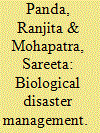

|
|
|
| 4 |
ID:
108996
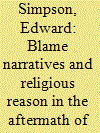

|
|
|
|
|
| Publication |
2011.
|
| Summary/Abstract |
Recent writing on religion in Gujarat has often confused political rhetoric with common religious belief and practice. Thus, religious categories have become caricatures standing for sociological realities and totalised worldviews. In this scheme, 'Hindus' and 'Muslims' are supposed to believe different things which ensure that they see and act in the world quite differently. In this paper, I examine the narratives of blame that emerged after the 2001 earthquake in Gujarat. The ethnography suggests that although religious identity plays a role in the way blame is cast, people of different religious communities also use common frames of logic and their shared experiences of shock and alienation to explain catastrophe. The religious reasoning of blame narratives is therefore shown to have a broader cultural existence outside the boundaries of particular religious identities.
|
|
|
|
|
|
|
|
|
|
|
|
|
|
|
|
| 5 |
ID:
086681
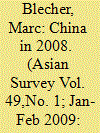

|
|
|
|
|
| Publication |
2009.
|
| Summary/Abstract |
In 2008 China faced Olympian challenges, of which the Olympics was but one. Some were of its own making; others were not. Some it set for itself; others were by-products of the structural reforms. Yet, the Chinese government met them with palpable determination and broad, if uneven, effectiveness.
|
|
|
|
|
|
|
|
|
|
|
|
|
|
|
|
| 6 |
ID:
170271


|
|
|
|
|
| Summary/Abstract |
In the aftermath of the 2005 earthquake that struck Pakistan-administered Kashmir an unprecedented number of development actors arrived in the region. Their impact influenced men’s perceptions of change in the gendered division of labour, as they claimed this arrival had increased women’s access to work in public spaces. Across urban and rural bazaars, a wide spectrum of male voices used this perceived increase to either try to further enhance women’s access or to curtail it. The struggle for women’s access to work in public spaces was visible in the stories these men told publicly. Although it pre-dated the earthquake, its aftermath made it more visible. Men’s narratives around women’s access to work post-earthquake also reflects a crisis of masculinity. The earthquake’s aftermath gave an opportunity for some men to reinforce the region’s classical patriarchy and others to challenge it; while doing so, men were also staking a claim at redefining what it meant to be a man.
|
|
|
|
|
|
|
|
|
|
|
|
|
|
|
|
| 7 |
ID:
102724
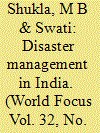

|
|
|
| 8 |
ID:
132494
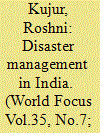

|
|
|
|
|
| Publication |
2014.
|
| Summary/Abstract |
Development and welfare of human beings is intimately related to the natural environment. Normally, environment is a source of livelihood but at times due to the intensive intervene made by human it brings
hazards like earthquake, cyclone, ?ood, landslide etc. further these hazards turns into disasters causing losses of life and property.' These hazards can be minimized by using modern scientific and technological
advancements. Disaster is a sudden adverse or unfortunate extreme event which causes great damage to human beings as well as plants and animals. Disasters I occur rapidly, instantaneously and indiscriminately which wipe out the years of development in a matter of hours. Disaster may be natural or man-made chaos and destruction reigns everywhere. It doesn't only justify initial death and damage occurrence but even the post-disaster tranquility and sufferings that too without any doubt regenerate pain and misery. Around 76% of India's coastline is prone to cyclones and tsunamis, while 59% of the country is vulnerable to earthquakes, 10% to-?oods and river erosion, and 68 %_to droughts? This has been stated by National Policy on Disaster Management that, "Disaster disruptsprogress and destroys the hard earned fruits of painstaking developmental efforts, often pushing nations, in to the quest for progress, back by several decades. Thus ef?cient management of disasters rather than mere response to their occurrence has in recent days received increased attention both in -India and abroad. This is as much a result of the recognition of the increasing frequency and intensity of disasters as it is an acknowledgement that good governance, in a caring and civilized society, needs to deal effectively with the devastating impact of disasters?"
|
|
|
|
|
|
|
|
|
|
|
|
|
|
|
|
| 9 |
ID:
112418
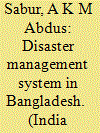

|
|
|
|
|
| Publication |
2012.
|
| Summary/Abstract |
Bangladesh and its people have been one of the worst victims of natural disasters from time immemorial. Conversely, facing and learning to live with natural disasters are equally an ancient preoccupation of Bangladeshi people. Disaster management in independent Bangladesh has undergone a complex process of development. While it received its impetus from concrete challenges faced at home, it also received inputs from developments, institutions and policies outside Bangladesh. In the process, Bangladesh has developed a workable system of disaster management that includes a set of mechanisms and processes, as well as a whole range of ways and means for the management of disasters. The article probes into the disaster management system in Bangladesh. In doing so, it begins with an overview of disasters in Bangladesh that helps explain the context of disaster management. The article studies the disaster management system in Bangladesh with a focus on concepts and theories, legal framework and institutional structure. On the basis of the above, an attempt is made to project an outlook for the future. Disaster and disaster management transcend and intersect national boundaries and geographical regions. Therefore, prevailing system of disaster management in Bangladesh could be of considerable importance to others involved in the same venture elsewhere in the world.
|
|
|
|
|
|
|
|
|
|
|
|
|
|
|
|
| 10 |
ID:
132486
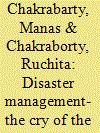

|
|
|
|
|
| Publication |
2014.
|
| Summary/Abstract |
One of the most crucial problems-with which mankind confronted with is de?nitely the ways and means of disaster management. In fact, mankind has survived and lived with natural disasters right from the days of the mythical universal deluge. (N arayan 2000). Many a times, mankind becomes simply a toy in the ands of the nature when it becomes furious due to ?ood or earthquake. Floods, volcanic eruptions and earthquakes have plagued and devastated humanity since time immemorial. (Narayan, 2000). The number" of natural disasters around the world continues to grow over time, and their impact on the stricken regions continues to be worsening. (Singh, 2000) In such situations, disaster management becomes really a major concern. Disaster management has assumed great importance of late, due to the occurrence of natural as well as manmade disasters. (Murthy, 2007).
|
|
|
|
|
|
|
|
|
|
|
|
|
|
|
|
| 11 |
ID:
107916
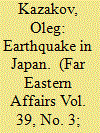

|
|
|
| 12 |
ID:
100862
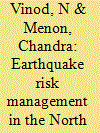

|
|
|
| 13 |
ID:
108878
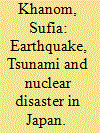

|
|
|
|
|
| Publication |
2011.
|
| Summary/Abstract |
This paper attempts to assess the impacts of the devastating natural disaster - earthquake followed by tsunami, that shook Japan on 11 March 2011, from socio-economic and development point of view. The intensity of the disaster was reflected through a destructive earthquake measuring 8.9 on Richter scale along with a tsunami at a speed of 500 miles/hour. Though, Japan is technologically and economically developed, it described the disaster as the worst crisis in the 65 years of its history since the end of World War II. Huge humanitarian crisis and massive disruption of industrial supply chains negatively affected the economic growth of Japan and put enormous stress on the psyche of Japanese people. The plight of the people had been compounded further by the threat of radiation exposure from the damaged reactors of nuclear power plants at Fukushima. The mishap at nuclear power plants at Fukushima posed some serious questions to the world: how safe nuclear power plants really are? Should the world look for a safer alternative to power problems? The disaster in Japan and its consequences have some serious impacts on Bangladesh from a development perspective. Japan has long been the principal donor and biggest development partner of Bangladesh. But the ongoing crisis in Japan may pose a threat or create some degree of uncertainty to the long term development planning of Bangladesh. Besides, the catastrophic experience of Japan has made Bangladesh rethink about its readiness to encounter similar disasters. As a climate induced vulnerable country, Bangladesh should strengthen its disaster management system by ensuring early warning system, as well as improving rescuing and relief management mechanism to combat such natural calamities.
|
|
|
|
|
|
|
|
|
|
|
|
|
|
|
|
| 14 |
ID:
111761
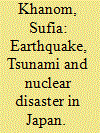

|
|
|
| 15 |
ID:
148844


|
|
|
|
|
| Summary/Abstract |
Six unnatural deaths, 70 injured on a single day is by all means a tragedy.
The casualty figure in the January 4 earthquake has risen to seven with
the death of one more in a school building collapse on January 6. This
sense of tragedy is despite the desensitisation to violent deaths that
insurgency torn places like Manipur has undergone. But the fact is, if
at all this is a consolation, the casualty figure could have been much
worse.
|
|
|
|
|
|
|
|
|
|
|
|
|
|
|
|
| 16 |
ID:
102127
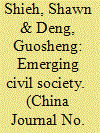

|
|
|
| 17 |
ID:
191317
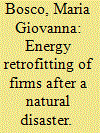

|
|
|
|
|
| Summary/Abstract |
In 2012, an earthquake struck one of Italy's most productive and dynamic areas, the Emilia-Romagna region. Just as policy makers are today considering green and climate-conscious investments to recover from the COVID-19 pandemic, in 2012, the regional government granted specific energy retrofitting contributions to manufacturing and service firms affected by the seismic event. Through a panel data analysis, we evaluate the impact of such energy policy measures on firm-level labour productivity to assess the presence of non-zero multipliers. We find that energy retrofitting through regional aids positively affected firms' labour productivity. We discuss the energy and economic policy implications of such intervention in the current framework of fiscal recovery packages.
|
|
|
|
|
|
|
|
|
|
|
|
|
|
|
|
| 18 |
ID:
083855


|
|
|
| 19 |
ID:
069230


|
|
|
| 20 |
ID:
109031
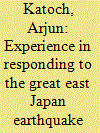

|
|
|
|
|
|
|
|